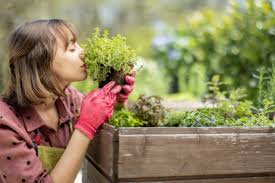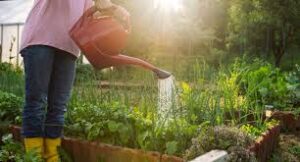Organic gardening is not just a trend; it’s a commitment to growing food in a sustainable, environmentally-friendly way. As more people become aware of the benefits of organic produce, the practice of growing your own vegetables organically is gaining popularity. Not only does organic gardening produce healthier vegetables, but it also supports biodiversity and reduces the environmental impact of conventional agriculture. This comprehensive guide will walk you through the best practices for organic vegetable gardening, ensuring a successful and rewarding gardening experience.
1. Understanding Organic Gardening

Organic gardening focuses on cultivating plants without synthetic chemicals, such as pesticides, herbicides, or fertilizers. Instead, it relies on natural processes and sustainable practices to nurture soil health and plant growth.
Key Principles of Organic Gardening:
- Soil Health: Building and maintaining healthy soil is fundamental to organic gardening. Healthy soil supports robust plant growth and enhances disease resistance.
- Biodiversity: Encouraging a variety of plants and beneficial organisms in your garden helps create a balanced ecosystem.
- Natural Pest Control: Organic gardeners use natural methods to manage pests and diseases, avoiding chemical interventions.
2. Preparing Your Soil
Healthy soil is the cornerstone of a successful organic garden. Preparing your soil properly will provide a strong foundation for your vegetable plants.
Steps for Soil Preparation:
- Test Your Soil: Start by testing your soil to determine its pH, nutrient levels, and texture. Soil testing kits are available at garden centers or online.
- Amend the Soil: Based on your soil test results, add organic matter such as compost, well-rotted manure, or peat moss to improve soil structure and fertility.
- Enhance Drainage: Ensure good drainage by incorporating organic matter or creating raised beds if your soil tends to retain water.
3. Choosing the Right Vegetables
Selecting the right vegetables for your organic garden is crucial for a successful harvest. Opt for varieties that are well-suited to your local climate and soil conditions.
Tips for Choosing Vegetables:
- Local Varieties: Choose vegetable varieties that are adapted to your local climate and growing conditions. Local nurseries or extension services can offer recommendations.
- Disease-Resistant Varieties: Look for vegetable varieties that are resistant to common pests and diseases in your area.
- Companion Planting: Consider companion planting to enhance growth and deter pests. For example, planting marigolds alongside tomatoes can help repel nematodes.
4. Planting Techniques
Proper planting techniques ensure that your vegetables get the best start possible. Follow these best practices for optimal results.
Planting Tips:
- Timing: Plant your vegetables at the right time for your climate. Refer to local planting calendars for guidance on when to sow seeds or transplant seedlings.
- Spacing: Provide adequate space between plants to ensure good air circulation and prevent overcrowding. Follow the recommended spacing guidelines for each vegetable variety.
- Depth: Plant seeds or seedlings at the correct depth. Refer to seed packets or plant labels for specific planting instructions.
5. Watering Wisely

Watering is essential for healthy vegetable growth, but it’s important to do it correctly to avoid overwatering or underwatering.
Watering Tips:
- Consistency: Water your vegetables consistently, keeping the soil evenly moist but not waterlogged. Deep, infrequent watering is generally better than shallow, frequent watering.
- Water Early: Water early in the morning to reduce evaporation and allow plants to dry before evening, which helps prevent fungal diseases.
- Mulch: Apply organic mulch, such as straw or wood chips, around your plants to conserve moisture, suppress weeds, and regulate soil temperature.
6. Managing Pests and Diseases Naturally
Organic gardeners use natural methods to control pests and diseases, avoiding synthetic chemicals.
Natural Pest Control Methods:
- Beneficial Insects: Encourage beneficial insects, such as ladybugs and lacewings, which prey on harmful pests. You can attract these insects by planting nectar-rich flowers like calendula and yarrow.
- Neem Oil: Use neem oil as a natural pesticide to control a variety of pests and fungal diseases. It works as a repellent and disrupts pest life cycles.
- Hand-Picking: For larger pests like caterpillars, hand-picking them off plants can be an effective method of control.
Disease Prevention:
- Crop Rotation: Practice crop rotation to prevent the buildup of soil-borne diseases. Avoid planting the same type of vegetable in the same location year after year.
- Disease-Resistant Varieties: Choose vegetable varieties that are resistant to common diseases in your area.
- Proper Spacing: Ensure adequate spacing between plants to improve air circulation and reduce humidity, which can help prevent fungal diseases.
7. Fertilizing Naturally
Organic fertilizers improve soil fertility and plant health without relying on synthetic chemicals.
Natural Fertilizing Tips:
- Compost: Use compost to add nutrients to the soil and improve its structure. Compost also helps retain moisture and supports beneficial soil organisms.
- Organic Fertilizers: Apply organic fertilizers such as fish emulsion, bone meal, or blood meal to provide essential nutrients to your vegetables. Follow package instructions for application rates.
- Green Manures: Plant green manures or cover crops, such as clover or rye, to enrich the soil with organic matter and nutrients.
8. Harvesting and Storage
Proper harvesting and storage techniques ensure that your vegetables remain fresh and nutritious.
Harvesting Tips:
- Timing: Harvest vegetables at their peak ripeness for the best flavor and texture. Refer to specific harvesting guidelines for each vegetable variety.
- Gentle Handling: Handle vegetables gently to avoid bruising or damaging them. Use clean, sharp tools to cut or pick vegetables.
Storage Tips:
- Cool Storage: Store harvested vegetables in a cool, dry place. Root vegetables can be stored in a root cellar or a cool basement, while leafy greens should be kept in the refrigerator.
- Preserving: Consider preserving excess vegetables through methods such as canning, freezing, or drying to enjoy your harvest year-round.
9. Sustainable Practices
Incorporating sustainable practices into your organic garden helps reduce your environmental impact and promotes long-term garden health.
Sustainable Gardening Practices:
- Reduce Plastic Use: Minimize the use of plastic in your garden by opting for biodegradable or reusable materials.
- Water Conservation: Implement water-saving techniques, such as rainwater harvesting or drip irrigation, to reduce water consumption.
- Soil Conservation: Avoid practices that degrade soil health, such as excessive tilling. Instead, use no-till methods and organic mulches to protect the soil.
10. Continual Learning and Adaptation

Gardening is a dynamic process that requires continual learning and adaptation. Stay informed about new techniques and trends in organic gardening to improve your skills and garden practices.
Ways to Keep Learning:
- Read Books and Articles: Explore gardening books, magazines, and online resources to stay updated on organic gardening practices and innovations.
- Join Gardening Communities: Participate in local gardening clubs or online forums to connect with other gardeners, share experiences, and seek advice.
- Attend Workshops: Attend gardening workshops or seminars to learn new techniques and gain hands-on experience.
Conclusion
Growing your own vegetables organically is a fulfilling and environmentally-friendly way to produce fresh, nutritious food. By following these best practices, from preparing your soil and choosing the right vegetables to managing pests naturally and practicing sustainability, you can create a thriving organic garden. Embrace the journey of organic gardening and enjoy the numerous benefits it offers, including improved soil health, reduced environmental impact, and delicious homegrown produce. Happy gardening!



